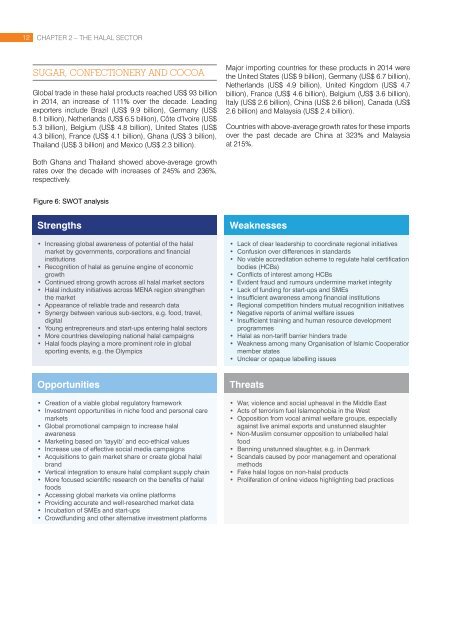Halal Goes Global
Halal_Goes_Global-web(1)
Halal_Goes_Global-web(1)
You also want an ePaper? Increase the reach of your titles
YUMPU automatically turns print PDFs into web optimized ePapers that Google loves.
12<br />
Chapter 2 – THE HALAL SECTOR<br />
Sugar, confectionery and cocoa<br />
<strong>Global</strong> trade in these halal products reached US$ 93 billion<br />
in 2014, an increase of 111% over the decade. Leading<br />
exporters include Brazil (US$ 9.9 billion), Germany (US$<br />
8.1 billion), Netherlands (US$ 6.5 billion), Côte d’Ivoire (US$<br />
5.3 billion), Belgium (US$ 4.8 billion), United States (US$<br />
4.3 billion), France (US$ 4.1 billion), Ghana (US$ 3 billion),<br />
Thailand (US$ 3 billion) and Mexico (US$ 2.3 billion).<br />
Major importing countries for these products in 2014 were<br />
the United States (US$ 9 billion), Germany (US$ 6.7 billion),<br />
Netherlands (US$ 4.9 billion), United Kingdom (US$ 4.7<br />
billion), France (US$ 4.6 billion), Belgium (US$ 3.6 billion),<br />
Italy (US$ 2.6 billion), China (US$ 2.6 billion), Canada (US$<br />
2.6 billion) and Malaysia (US$ 2.4 billion).<br />
Countries with above-average growth rates for these imports<br />
over the past decade are China at 323% and Malaysia<br />
at 215%.<br />
Both Ghana and Thailand showed above-average growth<br />
rates over the decade with increases of 245% and 236%,<br />
respectively.<br />
Figure 6: SWOT analysis<br />
Strengths<br />
• Increasing global awareness of potential of the halal<br />
market by governments, corporations and financial<br />
institutions<br />
• Recognition of halal as genuine engine of economic<br />
growth<br />
• Continued strong growth across all halal market sectors<br />
• <strong>Halal</strong> industry initiatives across MENA region strengthen<br />
the market<br />
• Appearance of reliable trade and research data<br />
• Synergy between various sub-sectors, e.g. food, travel,<br />
digital<br />
• Young entrepreneurs and start-ups entering halal sectors<br />
• More countries developing national halal campaigns<br />
• <strong>Halal</strong> foods playing a more prominent role in global<br />
sporting events, e.g. the Olympics<br />
Weaknesses<br />
• Lack of clear leadership to coordinate regional initiatives<br />
• Confusion over differences in standards<br />
• No viable accreditation scheme to regulate halal certification<br />
bodies (HCBs)<br />
• Conflicts of interest among HCBs<br />
• Evident fraud and rumours undermine market integrity<br />
• Lack of funding for start-ups and SMEs<br />
• Insufficient awareness among financial institutions<br />
• Regional competition hinders mutual recognition initiatives<br />
• Negative reports of animal welfare issues<br />
• Insufficient training and human resource development<br />
programmes<br />
• <strong>Halal</strong> as non-tariff barrier hinders trade<br />
• Weakness among many Organisation of Islamic Cooperation<br />
member states<br />
• Unclear or opaque labelling issues<br />
Opportunities<br />
• Creation of a viable global regulatory framework<br />
• Investment opportunities in niche food and personal care<br />
markets<br />
• <strong>Global</strong> promotional campaign to increase halal<br />
awareness<br />
• Marketing based on ‘tayyib’ and eco-ethical values<br />
• Increase use of effective social media campaigns<br />
• Acquisitions to gain market share or create global halal<br />
brand<br />
• Vertical integration to ensure halal compliant supply chain<br />
• More focused scientific research on the benefits of halal<br />
foods<br />
• Accessing global markets via online platforms<br />
• Providing accurate and well-researched market data<br />
• Incubation of SMEs and start-ups<br />
• Crowdfunding and other alternative investment platforms<br />
Threats<br />
• War, violence and social upheaval in the Middle East<br />
• Acts of terrorism fuel Islamophobia in the West<br />
• Opposition from vocal animal welfare groups, especially<br />
against live animal exports and unstunned slaughter<br />
• Non-Muslim consumer opposition to unlabelled halal<br />
food<br />
• Banning unstunned slaughter, e.g. in Denmark<br />
• Scandals caused by poor management and operational<br />
methods<br />
• Fake halal logos on non-halal products<br />
• Proliferation of online videos highlighting bad practices


